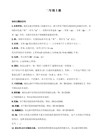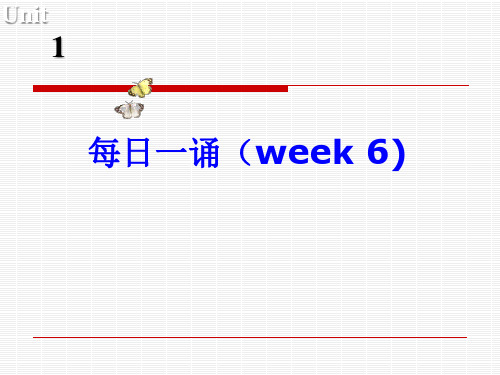英语每周一读2014.05.06
外研版(2024)七年级上册 Unit 5 Period3 +I:Listening

·英语
请听第二段对话,回答第3~4小题。对话听两遍。 3.How does Tina feel? (Tired./Happy./Upset. ) 4.What is the man’s advice? (To raise money for the nature parks. / To join the Wildlife Conservation Organization./ To call on people to protect animals.)
__S_w_i_m__m_i_n_g_./_T_h_e_y_’_r_e_g_o_o_d__a_t_s_w_i_m__m_i_n_g_._________________
4.Where are the elephants in the zoo from?
__A_s_i_a_./_T_h_e_y_’_r_e_f_ro_m___A_s_ia_.______________________________
carry it.
·英语
2.His most amazing rescue took place after the 2008 Wenchuan earthquake. 他最神奇的救援发生在2008年汶川地震。
·英语
请用take place, happen的适当形式填空。 (1)A traffic accident happened this morning. (2)The Olympic Games take place every four ythirteen C.learn
D.after
( C )2.A.over B.teacher
C.earthquake D.writer
( D )3.A.teacher B.sister
英语每天一读

a cat and dog life 水火不容的生活
The husband and his wife are always quarrelling,and they are leading a cat and dog life.这对夫妇老是吵架,相互之间水火不容。
do somone good 对某人有好处
Having some moring exercises does you good.
Do you get me? 你明白我的意思吗?
doesn't count 这次不算
It doesn't count this time,try again.
I konw how you feel.我明白你的感受。
You win some.you lose some.胜败乃兵家常事。
Don't bury your head in the sand.不要逃避现实。
I didn't expect you to such a good job.我没想到你干得这么好。
You should be slow to judge others.你不应该随意评论别人。
I hope you will excuse me if i make any mistake.如有任何错误,请你原谅
It was most careless ofme.我太粗心了。
It was quite by accident.真是始料不及。
表示频率的英文短语five days a week

表示频率的英文短语"five days a week"在日常生活中,我们经常会用到一些英文短语来表示某种频率或定期性。
其中,"five days a week"就是一个常用的表示频率的短语。
它通常用来描述某种活动或事件发生的频率,表示每周有五天都会进行这个活动或发生这个事件。
接下来,我们将详细介绍这个短语的用法及相关注意事项。
一、"five days a week"的用法1. "five days a week"的含义"five days a week"是一个英文短语,字面意思是"一周五天"。
在实际使用中,它通常用来表示某种活动或事件每周进行的频率,表明这个活动或事件每周有五天会进行。
我们可以说"I work five days a week"来表示自己一周工作五天。
2. "five days a week"的灵活运用除了用来描述工作频率之外,"five days a week"也可以用来表示其他活动或事件的频率。
"I go to the gym five days a week"表示我每周去健身房五天。
这个短语可以灵活运用在各种场合,只要是描述每周出现的活动或事件的频率都可以使用。
二、"five days a week"的相关注意事项1. 注意与其他频率短语的区分在表示频率时,除了"five days a week"外,还有一些其他常用的频率短语,比如"every day"(每天)、"twice a week"(每周两次)、"once a month"(每月一次)等等。
在使用这些短语时,要注意根据实际情况选择合适的表达方式,避免混淆。
周一到周日的英文怎么读

周一到周日的英文怎么读从星期一到星期日,在英文里都有不一样的读法,你知道应该怎么读吗?现在我们来看下经常使用到的一周七天的读法和写法吧。
周一到周日的英文读法星期一 Monday星期二 Tuesday星期三 Wednesday星期四 Thursday星期五 Friday星期六 Saturday星期日 Sunday周二和周四有些相近,注意不要搞混了。
周一到周日的英文说法来历在英语里,七天各有其名。
这是盎格鲁萨克森人为纪念他们崇拜的神而命名的。
除了星期六(Saturday)来源于罗马的萨图恩神(saturn)以外,其余六天的名字都来源于北方诸神。
星期一: Monday,the day of the Moon,从Moonday发展至现在的Monday,“月亮日”。
星期二: Tuesday,源于Tiwesday,“战神日”。
Tiw是北欧神话里的战神,正如同罗马神话里的战神Mars一样。
在北欧神话中不叫Tiw而叫Tyr。
相传在他的那个时代,有一狼精经常出来扰乱世界,为了制服狼精,Tyr的一只手也被咬断了。
星期三:Wednesday,源于Woden’sday,“Woden”是风暴之神,“风神日”。
Woden是北欧诸神之父。
为制服狼精而牺牲自己一只手的Tyr,就是他的儿子。
Woden领导神族跟巨人族作战,他曾牺牲自己锐利的右眼,跟巨人族换取“智慧”的甘泉。
他也曾深入地层,从巨人族那里偷取“诗”的美酒。
西方人为了追念这位主神,就根据他的名字创造了Wednesday这个字。
星期四:Thursday,是为了纪念雷神(Thor)而命名的。
故星期四又称为“雷神日”。
红头发的雷神索尔(星期四的来源)是主神奥丁的儿子,他戴着一副特殊的绶带和手套,具有超人的力量,能够把岩石击碎。
相传有一次,他的大铁被一位叫Thrym的巨人偷走了。
Thrym扬言,除非神族答应把美丽的爱神Freya嫁给他做为交换。
然而Freya抵死不从,於是神族想了一个办法,由Thor男扮女装穿Freya的衣服,假装嫁给他,Thrym不疑有诈,把铁交给新娘。
每日一诵6

作文金Байду номын сангаас(话题)
随着生活节奏的加快,人们选择网上购物以节省时间 和精力的现象很普遍。
As the pace of life quickens, it is natural for people to choose online shopping to save time and energy. 众所周知,随着人们生活水平的提高,汽车已经成了 常见的交通手段,给我们的生活带来了便利。
易混点(非谓语动词做定语)
She was the first woman to win the gold medal in the Olympics. It is one of the funniest things found on the Internet so far this year. The genaral ordered ,“Everyone present should keep the plan being discussed now a secret”. If the building project to be completed by the end of this month is delayed, the construction company will be fined.
他只不过是个工人。
高考精粹(时态)
We won’t start the work until all the preparations have been made.
The manager is said to have arrived back from Paris where he had met some European business partners.
1月到12月和周一到周日的英语单词

1月到12月和周一到周日的英语单词Here is a 700-word article on the English words for the months and days of the week:The Wonderful World of Months and Days。
As we move through the calendar year, we encounter a fascinating array of words that describe the various months and days of the week. These linguistic gems not only serve to delineate the passage of time, but also carry with them rich cultural histories and etymological origins.Let's begin our journey with the months of the year. January, derived from the Roman god Janus, the deity of beginnings and endings, ushers in the new year with a sense of hope and renewal. February, from the Latin word "februum" meaning purification, was historically the time for religious rituals and cleansing. March, named after the Roman god of war, Mars, was once considered the first month of the year, a time for military campaigns and the stirrings of spring.April, from the Latin "aperire" meaning "to open," celebrates the blossoming of nature, while May, named after the Greek goddess Maia, revels in the verdant splendor of the season. June, derived from the Roman goddess Juno, is a time of marriage and fertility, while July, honoring the mighty Julius Caesar, exudes a regal air.August, named for the first Roman emperor, Augustus, embodies the height of summer's glory, while September, from the Latin "septem" meaning seven, was originally the seventh month of the year. October, from the Latin "octo" meaning eight, follows suit, and November, from the Latin "novem" meaning nine, rounds out the autumnal months.Finally, we arrive at December, from the Latin "decem" meaning ten, which once marked the end of the ancient Roman calendar year.Now, let us turn our attention to the days of the week. Monday, derived from the Old English "Mōnandæg," literally translates to "moon's day," a nod to the lunar cycle thatgoverns our lives. Tuesday, on the other hand, is named after the Germanic god Tyr, the deity of war and law.Wednesday, from the Old English "Wōdnesdæg," pays homage to the powerful Norse god Odin, also known as Wodan. Thursday, derived from the Old English "Þūnresdæg," celebrates the mighty Thor, the god of thunder, while Friday, from the Old English "Frīgedæg," is named after the goddess Frigg, the wife of Odin.Saturday, from the Latin "Sāturnī diēs," honors the Roman god Saturn, while Sunday, from the Old English "Sunnandæg," is a testament to the sun, the giver of life and light.As we delve into the rich tapestry of these words, we uncover not only the passage of time, but also the deep-rooted cultural and mythological foundations that have shaped our understanding of the world around us. Each month and day carries with it a unique story, a testament to the enduring power of language to capture the essence of human experience.In the end, the words that define our calendar are not merely labels, but windows into the very heart of our shared history and collective consciousness. As we move through the seasons and days, let us embrace the wonder and significance of these linguistic treasures, for they are the threads that bind us to the rhythms of the universe.。
英语每日一读(12篇)
I am Chinese我是中国人I'm from China我来自中国our country is great我们国家是伟大的and has a long history 有着悠久的历史I love my country我爱我的国家welcome to china欢迎你来中国You are beautiful.你很漂亮You are so kind.你很善良You are so cute.你很可爱You are sexy.你很性感You are honest.你很诚实Every dog has its day凡人皆有得意时l won't buy your story 我不信你那一套Don't look wise.不要自作聪明You are going too far你太过分了I'm dying to see yous我真想见到你A place called home一个叫做家的地方This is a room这是一个房间The room is in a house 这个房间在一间房子里The house is on a street 房子在街上The street is in a city这条街在一个城市里木Do you like me!你喜欢我吗?I came here for you.我为你奔赴而来I'll always be with you.我会永远陪在你身边I'm into you我爱上你了I just want you to be happy.我只是想要你开心啊A new classroom一间新教室Hi!I'm Sarah.We have a new classroom.lt's very big.嗨!我是萨拉。
我们有一间新的教室。
它非常大。
You can see two blackboards,a computer,six fans,many desks and chairs.你可以看到两块黑板,一台电脑,六台风扇,许多课桌和椅子。
14年英语一第一篇阅读原文
14年英语一第一篇阅读原文摘要:1.了解文章背景和主题2.分析文章结构和组织3.提炼关键信息和要点4.总结文章观点和启示正文:1.手机在现代生活中的地位和作用在当今社会,手机已经成为人们生活中不可或缺的一部分。
它不仅是一个通讯工具,还承担着娱乐、学习、购物等多种功能。
据统计,超过80%的成年人手机不离身,手机使用时间占据每人每天大量时间。
这使得手机在现代生活中具有举足轻重的地位。
2.研究背景及目的鉴于手机在人们生活中的重要地位,研究人员开始关注手机使用对人类生活的影响。
一项针对手机使用与人类生活关系的研究应运而生。
该研究旨在探讨手机使用对人际交往、心理状况、生活习惯等方面的影响,以期为人们提供合理使用手机的建议。
3.研究发现:人际交往、心理状况、生活习惯等方面研究发现,手机使用对人际交往产生了一定的负面影响。
随着手机的普及,人们在现实生活中的交流越来越少,更多的人选择用手机APP来沟通。
这导致人际交往能力下降,甚至影响到人们的情感和心理健康。
此外,长时间使用手机还会导致心理压力增加。
研究发现,手机成瘾者更容易出现焦虑、抑郁等心理问题。
这主要是因为手机屏幕的蓝光会影响大脑分泌褪黑素,进而影响睡眠质量。
在生活习惯方面,手机使用对人们的作息时间、锻炼习惯等也产生了影响。
许多人晚上使用手机时间过长,导致熬夜、睡眠不足等问题。
同时,手机游戏等娱乐功能使人们在业余时间减少了锻炼,从而影响到身体健康。
4.正确对待和使用科技,保持身心健康面对手机等科技产品带来的负面影响,我们应该认识到科技的双面性。
在使用手机等科技产品时,要学会控制自己,避免过度依赖。
合理安排时间,保持良好的作息习惯,增加锻炼,以保持身心健康。
此外,我们还应关注科技产品对人际交往的影响,尽量多进行面对面交流,培养良好的人际沟通能力。
在享受科技带来的便利的同时,不忘培养自己的情感和心理素质,以应对现代生活中的种种挑战。
总之,手机和科技产品已经成为现代生活的重要组成部分。
13.小学英语五年级下阅读每周一篇(第13周)
(
) 4. A: _________________________ B: Chinese people did.
(
) 5. A: _________________________ B: Miss Wang.
本文难度:★★★★ 个人评价: 阅读所需时间:
参考答案:基础练习 1.F 2. F 3. T
1
王庄镇中心小学五年级下英语阅读每周一篇(第 14 周)
( ( ( ( ) 2. My mum read a book under an umbrella. ) 3. I wanted to eat ice cream. ) 4. The dog wanted to steal the man’s handbag. ) 5. We called the police for help.
拓展练习 根据答语选择合适的问题。 A. Who was your first teacher? C. What did you do yesterday? E. When did you get up yesterday? B. What did you see? D. Who invented paper?
词汇积累 1. incident 3. belong to 5. steal n. 事件;事故 属于…… 2. strange 4. train 6. caught v. adj. 奇怪的 训练 v. catch 的过去式
v. 偷Байду номын сангаас
基础练习 根据短文内容,判断正(T)误(F) 。 ( ) 1. I went to the beach last weekend.
(
) 1. A: ______________________ B. I went to the beach with my family.
星期一到星期日的英文意思
星期一到星期日的英文意思星期日 Sunday星期一 Monday星期二 Tuesday星期三 Wednesday星期四 Thursday星期五 Friday星期六 SaturdaySunday(星期日)日尔曼民族和古罗马人一样,有时也用日月星辰来命名一星期中的某一天。
作为一星期的第一天,Sunday在古时候是献给太阳的,古英语里拼作Sunnandaeg。
犹太教的安息日定在星期六,基督教之所以改星期日为安息日,是因为耶稣在这一天复活。
约从公元4世纪起,罗马天主教会就将Sunday定为假日,在这一天禁止任何人工作,教徒都得停止一切娱乐活动,上教堂去做礼拜。
Monday(星期一)在古罗马神话中,月亮为太阳之妻。
因此,在一星期中也必须有一天是献给月亮的。
他们把一星期的第二天叫做Lunaedies,盎格鲁———撒克逊人借译了该词,作Monandaeg,意即Moon day,现代英语作Monday。
Tuesday(星期二)在北欧神话中,有一个战神名叫Tyr,相当于罗马神话里的 Mars。
当狼精Fenrir在人间作恶时,Tyr自告奋勇前往擒拿,在绑缚狼精时,一只手被咬掉了。
Tyr在古英语中拼作Tiw,从Tiw产生了古英语词Tiwesdaeg,意即the day of Tiw,这就是现代英语Tuesday的原始形式。
Wednesday(星期三)在古英语中原作 Modnesdaeg,意即Woden's day。
Woden乃日尔曼战神Tyr之父,相当于罗马神话里的商业神Mercury。
古罗马人以Mercury来命名星期三,把星期三叫做Mercurii dies。
其实,英语Wodnesdaeg就是译自该拉丁词,只是在借译时Mercury 换成了Woden而已。
Thursday(星期四)在北欧神话中,最有权势、最勇敢的神要数雷神Thor。
他相当于罗马神话里的主神Jupiter /Jove。
当Thor驾着公山羊拉的战车奔驰而过时,天空顿时雷轰电闪。
- 1、下载文档前请自行甄别文档内容的完整性,平台不提供额外的编辑、内容补充、找答案等附加服务。
- 2、"仅部分预览"的文档,不可在线预览部分如存在完整性等问题,可反馈申请退款(可完整预览的文档不适用该条件!)。
- 3、如文档侵犯您的权益,请联系客服反馈,我们会尽快为您处理(人工客服工作时间:9:00-18:30)。
现在进行时用法 1 强调:此时此刻正在 用法 2 强调:将要打算做某事
send sb. to…. helpless among many take care of There be
送某人到….. 无助的,无依无靠的,less 表示否定意义的后缀 在…之中,强调三者以上的多者中 许多,修饰可数名词复数 照顾 请问短语帮助某人做某事怎么说? 请问两者之间用哪一个介词? 请问修饰不可数名词复数用什么? 请问另一个相同意思的短语是什么?
英语小故事
每周一读
2014.05.06
Angel Once upon a time, there was a child ready to be born [bɔrn]出生. One day he asked God, “They tell me you are sending me to the earth, but I am so small and helpless [‘helplis]无助的,无依无靠的, how am I going to live there?” “Among the many angels [‘endʒəlz]天使, I choose [tʃuz]选择 one for you. She will take care of you .Your angel will sing and smile for you every day. And you will feel your angel’s love and be happy.” The child said, “I hear that on the earth there are bad men. Who will protect [prəˈtɛkt]保护 me?” God said, “Your angel will protect you even if she loses [lu:ziz]失去 her life.” “Oh, God, I am about to leave now. Please tell me my angel’s name!” the child said. “It is not hard to remember [rɪˈmɛmbɚ]记住,” God said softly [sɔftli]温柔地. “You will call your angel Mommy.”
小结: once upon a time was be born 从前 am/is 的过去式 被动语态基本结构:be+v. p.p(过去分词) 请问后面句子用哪种时态?现在,过去还是将来? 请问 are 的过去式是什么?
英语小故事
每周一读2014.0Fra bibliotek.06are sending me to
be+v.ing 进行
it is not hard to ….. 很容易…… remember 记住
表示某处存在某人或某物, be 用单数还是复数取决 请问 there be 能否与 have 连用? 于 be 后面所跟名词的单复数, 即就近原则, 否定形 式 there be not
be about to
行将,正要 it is (not) + adj. +to do… 请问 remenber to do 和 remember doing 有什么区别
